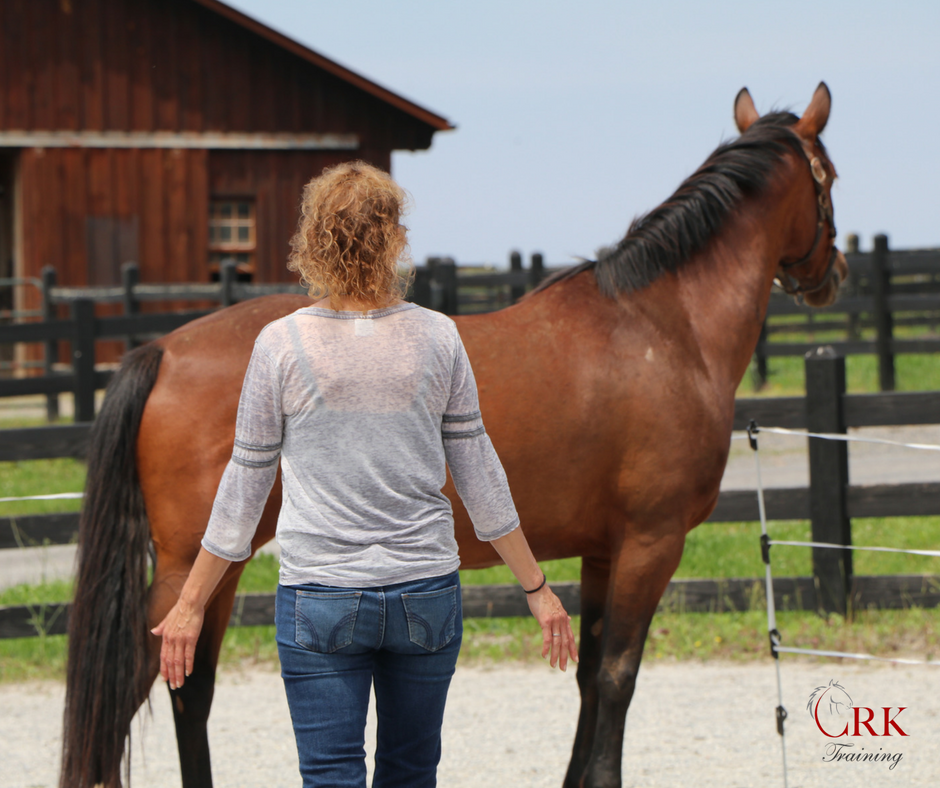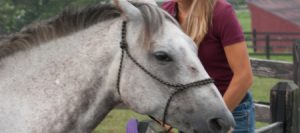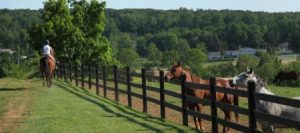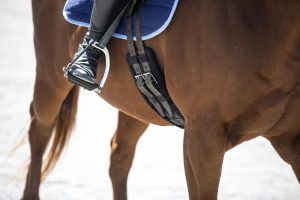Our connection to horses can be a respite from many of the concerns in our human lives. But when that connection seems to fail due to our horse jigging around, snatching at the bit, calling frantically for other horses, and generally acting like a hot mess, it can create just one more form of frustration and the feeling of loss of control in our lives.
So here is what can cause anxiety in horses, and what you can (and can’t) do about it.
First, horses don’t choose to be anxious. They aren’t carrying on to be disrespectful, uncaring, or ungrateful for all the feed bills we pay.
Being anxious is no more a pleasant state for a horse than it is for a person. Our anxious horses want to feel better. Sometimes we can help them.
In this article, I am going to discuss five main causes of anxiety in horses.
These are:
Physical Discomfort
Poor Balance
Lack of Certainty and Predictability in Their Environment (hint… we are part of the horse’s environment)
Lack of Connection to Others (horses are a social species)
Personality (this is a mix of genetics, experiences, and other aspects of personality we may not understand yet)
All of these essentially come back to one factor – perceived safety.
If the horse feels safe, they will feel better. If they feel unsafe, the nervous system kicks in with heightened awareness and survival responses – i.e. spooking, rushing forward, frantic movements, even kicking, biting, or bucking.
By understanding each of these causes, we can also find the solutions, to help our horses and ourselves.
- Physical Discomfort
Pain can make anyone irritable. Our horses can’t describe their pain, so conditions like gastric ulcers may cause pain, irritability, and anxiety without obvious symptoms.
Other physical conditions such as lymes disease can also cause increased anxiety along with other symptoms.
The equipment we use also plays a huge role in the horse’s comfort while we are riding. A poor fitting saddle, pinching too-small bit, or literal burr in the saddle pad can cause a big behavior change, even from the most stoic of horses.
It is always a good idea to check your equipment, as even changing body shapes as horses gain or lose weight or muscle mass can make previously well-fitted equipment no longer fit.
If your normally calm horse suddenly becomes worried and nervous without other changes in their management, get your veterinarian involved to see if there is an underlying problem.
2. Poor Balance
This may be the most underestimated source of anxiety for horses. If a horse does not feel stable on their feet, they will become nervous, perhaps rushing forward in an attempt to catch their balance, not wanting to stand still, or being easily startled and spooky from hypervigilance.
Balance, or lack thereof, can be recognized by looking at a horse’s posture and movement. Horses who have their neck high and back hollow, with the appearance they are leaning over their front feet, are displaying poor balance.
This may be accompanied by “ewe-neck” muscling patterns, where the bottom of the horse’s neck is more heavily muscled than the top.
Exercises that strengthen and supple the horse’s body, teaching them how to carry the weight of a rider, and how to better organize their own bodies can improve balance and lessen anxiety.
3. Lack of Certainty and Predictability in their Environment
If a horse does not know what to expect, either because of a new situation, such as being at a horse show, or from the way they are managed, perhaps living at a busy barn where new horses are always coming and going.
When we are working with our horses, we are also part of their environment, and our actions as well as our internal state has a big impact on their mood and behavior.
If we are not consistent in how we handle them, or we are not internally regulated, meaning we try to present a calm front, but inside our thoughts are racing, this will also lower the feeling of safety for our horses and make them more anxious.
4. Lack of Connection to Others
For any social species, connection to others creates safety. A lone horse is more vulnerable to predators but togetherness is more than just being in the same pen as other horses. Only when the horse feels connected to others can they feel truly safe. In a natural herd environment, the horse would have rich social interactions, perhaps having a few “friends” that they spend more time with, but also having the security of the herd.
With our domestic horses we see more pair-bonding, as horses are kept in smaller groups and are more likely to form intense connections to one or two other horses, creating anxiety when they are separated.
5. Personality
Two horses may have had the same training, gone to the same number of horse shows, even be the same breed, and yet behave very differently.
Personality is created by a number of factors, it is part genetics, part life experience.
Some horses are more sensitive than others. No matter how much great training they have, they will likely always more sensitive and more easily slip into anxiety when any of the previous four factors is present.
Many times, part of working with an anxious horse is accepting them for who they are. That may mean accepting them day by day, working with the horse in front of you instead of the horse you wish they could be.
An anxious horse can be frustrating. Whether we have to give up our plans for the day, or adapt our bigger expectations for the horse, working through anxiety can be a reminder of what is really important.
In the end, the moments we remember and cherish the most are not about performance. They are about connection – seeing your horse run up to meet you at the gate, turning around to see them still watching you as you walk away after a training session, the feeling of partnership as you sail over a jump together, or explore a new trail.
Creating these moments is the process of good horsemanship. When we can pause to consider the horse’s point of view and know that our relationship with them is what matters more than achieving the leg yield or lead change, we discover the real reason that we love to ride.
***
If you are interested in knowing your horse better and creating the kind of relationship where your horse also looks forward to your time together, Join In on the Free Pure Liberty Workshop with Andrea Wady. Click Here to Register














23 Responses
WOW! Hit the nail on the head. Really saw clearly, my mare. I KNEW she had a reason for her extremely nervous behavior. Several of the issues fit her to a T. Now onto how I can be her help not just her rider
THANK YOU
Mary
Tx. I recently moved my OTTB to a new facility and he immediately bonded with a mare in their 4-horse shared run. His resulting separation anxiety has become a real bear. I’ve tried working with him on the ground and in the saddle (trying to get his focus on me by moving him around, and by getting him to lower his head and relax.). He’s 15, I’ve had him since age three and it has never been this bad before. We have days when he is a perfectly relaxed gentleman, and the next he is squirrelly, jiggy, moving every way but what I am asking for, and yelling. I try to be patient but firm and to release pressure at the right time, but am at my wits end. Going to ask property owner if we can separate them… maybe move him from run to run over a month or so? Open to suggestions.
Hi Julie, I’m sorry to hear you’ve been struggling with some issues of your horse being herd bound. If he has not always had those behaviors I would recommend asking the owner if you can change his turnout situation!
-Julia Burdy, CRK Training Community Manager
Great article. I totally agree with the point three, especially with the part about keeping your inner calm. Horses feel when there is this inconsistence about outside pose and inside thoughts pace.
Thank you.
Kate, absolutely! Horses can pick up on so much from the people in their lives and feed off of those emotions!
-Julia Burdy, CRK Training Community Manager
Really love the comments about personality. I used to think my horse should see me as the leader and do or go where I want him to. But now I decided to approach it as a partnership and respect and listen to him if he feels uneasy. We go the way we both want to and it is a much better approach. It has been working well for us. He is an Arab who tends to be on high alert most times. Now I feel like he trusts me to not make him go in a scary direction, and he is more willing to try.
I love this Catherine! Trust is a two way street in any relationship – that includes the one with our horses
-Julia Burdy, CRK Training Community Manager
…feeling of a partnership , as you sail over a jump together .,,
I remember seeing some time back a picture of yours over a jump ( I think it was a blue t shirt ) and with flower pots besides the jump rail . That picture was sheer dynamite, and I described it to family such! What came to mind while seeing the photograph was a very effortless fluid ease , with no
‘ constrains of concentration “ , and less a sense of accomplishment . A moment of impersonal flow …,thoroughly enjoyed seeing that snap .
Accept them for who they are is lovely advice. I have a mare who gets anxious at times and after a few years of struggling with this (I am not the most confident person either!) I understand her better and have accepted that she’s not trying to throw me off, just needs help to work through it…
Hi Lyz, I’m glad you enjoyed this video! I hope you and your mare continue to grow together!
-Julia Burdy, CRK Training Community Manager
I have one of those lovely very reactive communicative Arabs. Having been moved from a free-range Alberta herd where he had happily been for 12 years to Vancouver Island where horse-boarding is mainly smaller paddocks and only herd-field living is available in the drier months he has become a chronic anxious mess. There have been improvements up and down but it is always there.
Thanks to an excellent trainer across the lane and having read many of your very thoughtful posts I have become very aware of his messages to me. Just a couple of weeks ago in a scenario where he was clearly concerned about going back into his field where there was a dominant gelding and an enthusiastic mare I decided to let him lead me to where he might want to go. He immediately turned tail and dragged me (gently) away from the gate up behind the shavings shed where he hid from them !!! WOW I thought, now that really is voting with your feet ! So I took him into his stall and paddock early and left him happily there eating hay. Yes indeed it is so interesting to see the inner world of our horses. All ends well with the news that those three are now fine with each other. Thanks so much for the work you do.
It sounds like you are great horse listener Lavinia
-Julia Burdy, CRK Training Community Manager
Great post-am passing it on!
Hi Claire, thanks for sharing our post!
-Julia Burdy, CRK Training Community Manager
Hi Callie I purchased my first horse 5 weeks ago! He is a gentle horse aged 13 but ex riding school and shows clear signs of not wanting human contact around and in his stable… I guess he is fed up of sharing his space. His ears go back when I arrive, he used to turn his butt my way when entering the stable (over this now) but I can’t seem to stop the ears back and if I reach to him for example to take off the stable rug, he fake bites at me. Also when at his stable door if I reach towards him again ears back and fake bites. Over the weeks he has started to relax with putting on the head collar ( again used to be butt in my face) and is now fine to lead out and tack up. Any suggestions on those ears and teeth? Sue (UK)
Hi Sue, I have the perfect recommendation for you and your new horse! I would recommend signing up for our Free Online Liberty Workshop, there you will find Andrea’s liberty exercises to help develop a better relationship. You can click here to sign up and watch the first ride.
-Julia Burdy, CRK Training Community Manager
Very good article. I have a horse that hates being left alone, so the paragraph about understanding and accepting the horse personality is good information
Thank you
Stephanie
Glad this video helped you Stephanie! Just like people, we do have to accept our horses for who they are
-Julia Burdy, CRK Training Community Manager
The link to register for the Liberty does not appear to be working.
Hi Joyce, try clicking here and let me know if that works!
-Julia Burdy, CRK Training Community Manager
Hi, I was watching the, Does Your Horse Need a Bigger Bit, video but am unable to find it now so I’ve posted my question here. I hope that’s okay. We have a horse who’s just joined us and I was told that she’s always used a bitless bridle. I want to try her on a bit just because I feel a better connection with a horse when riding. She’s not very happy with a bitless bridle as she shakes her head, rushes and crow hops when I use it. Even when being led or being ridden bare back. I wonder if you have any comments or recomendations. Thank You
Hi Patti, have you had her teeth looked at? There is a possibility that this could be a physical issue! I would recommend starting there. We also use a soft rubber bit that we recommend called a Nathe bit, that could be another option for you to try!
-Julia Burdy, CRK Training Community Manager
Loved to read of the importance of connection, rather than performance today. One of my most cherished memories: my gelding was in the field with his mare friend, I came out, called, he looked at me, he looked at her, and then he came walking to the gate where I was standing. Quite the honour! Of course, when I let him out after schooling, he RAN to his pasture mate. LOLs.